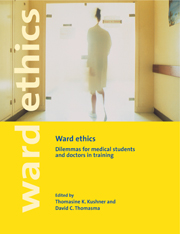Book contents
- Frontmatter
- Contents
- Acknowledgments
- List of contributors
- Prologue. Breaking the silence
- Letter from a young doctor
- Part I On caring for patients
- Section 2 Problems in truth-telling
- Section 3 Setting boundaries
- Part II On becoming a “team player”: searching for esprit de corps and conflicts of socialization
- Section 5 Argot, jargon, and questionable humor: assuming the mantle at the patient's expense
- Section 6 Making waves: questioning authority and the status quo
- 17 Personal identity
- 18 Duties to treat?
- 19 Hierarchy and the dynamics of rank
- 20 Conflicts of interest
- Section 7 Perceiving misconduct and whistle-blowing: observing peers or superiors commit an act deemed unethical
- Epilogue: Using this book
- Glossary
- Index
20 - Conflicts of interest
Published online by Cambridge University Press: 05 February 2015
- Frontmatter
- Contents
- Acknowledgments
- List of contributors
- Prologue. Breaking the silence
- Letter from a young doctor
- Part I On caring for patients
- Section 2 Problems in truth-telling
- Section 3 Setting boundaries
- Part II On becoming a “team player”: searching for esprit de corps and conflicts of socialization
- Section 5 Argot, jargon, and questionable humor: assuming the mantle at the patient's expense
- Section 6 Making waves: questioning authority and the status quo
- 17 Personal identity
- 18 Duties to treat?
- 19 Hierarchy and the dynamics of rank
- 20 Conflicts of interest
- Section 7 Perceiving misconduct and whistle-blowing: observing peers or superiors commit an act deemed unethical
- Epilogue: Using this book
- Glossary
- Index
Summary
CASE
“Should I accept drug company goodies?”
It is no secret that throughout all the years of training, and beyond, drug companies court doctors. Also obvious is the fact that the companies lavish more attention on us as residents than when we were medical students; but in my experience, from the very beginning the lure of drug company offerings has been an ever-present enticement. There are all those free pens, writing pads and, more temptingly, weekly lunches in the conference room cosponsored by a department and a drug company. Knowing there is no such thing as a truly “free lunch,” and these perks are being offered for a purpose, should I accept drug company goodies? I do not feel that I am selling my soul by accepting hospitality and marketing gifts, but at the same time I do not feel entirely comfortable. Is my integrity necessarily compromised by enjoying such benefits? Would it be morally permissible to accept some perks but not others?
COMMENTARY
Gifts from industry
The universal practice of pharmaceutical companies bestowing gifts on physicians is well documented. (1–6) However, this practice is controversial because gifts cost money, and the cost is ultimately passed on to their patients without their explicit knowledge.
- Type
- Chapter
- Information
- Ward EthicsDilemmas for Medical Students and Doctors in Training, pp. 208 - 214Publisher: Cambridge University PressPrint publication year: 2001

